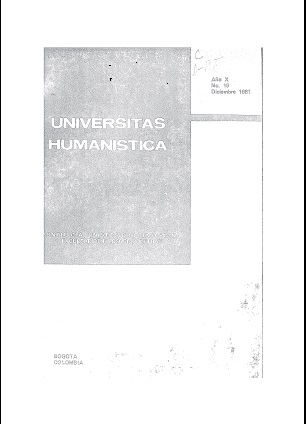Abstract
El presente artículo contiene un estudio, todavía de carácter descriptivo, sobre los fenómenos de crisis y bonanzas ecológicas que revisten particular importancia en el proceso cultural de todo grupo humano.
Situaciones de Ecología Natural y Humana unas veces desfavorables crisis ecológicas - y otras favorables - bonanzas ecológicas -, inciden en el régimen de vida de una comunidad. El Grado de intensidad y las repercusiones de éstos fenómenos ecológicos naturales y humanos varían notablemente en cada pueblo, pero han marcado ciertas tendencias evolutivas y de desarrollo generales como: la incesante transformación de los Ecosistemas biológicos natura-fes en Antroposistemas civilizatoríos (cada pueblo posee el suyo propio); la creación de Focos de Cambio Cultural diseminados irregularmente por la ecu-mene; la emergencia de Variables Específicas de crisis y bonanzas en el seno de toda comunidad.
Toda esta problemática es presentada desde el interés, más o menos explícito, de su aplicabilidad en los países del Tercer Mundo. La Ecología Humana, como disciplina especializada dentro del campo de la Antropología, abre grandes perspectivas, entre otras posibles, para la comprensión y defensa de la i-dentidad cultural de nuestros pueblos en vías de desarrollo.

This journal provides immediate open access to its content on the principle that making research freely available to the public, encourages greater global exchange of knowledge.
The journal Universitas Humanística is registered under a Creative Commons Attribution 4.0 International Public License. Thus, this work may be reproduced, distributed, and publicly shared in digital format, as long as the names of the authors and Pontificia Universidad Javeriana are acknowledged. Others are allowed to quote, adapt, transform, auto-archive, republish, and create based on this material, for any purpose (even commercial ones), provided the authorship is duly acknowledged, a link to the original work is provided, and it is specified if changes have been made. Pontificia Universidad Javeriana does not hold the rights of published works and the authors are solely responsible for the contents of their works; they keep the moral, intellectual, privacy, and publicity rights.
Approving the intervention of the work (review, copy-editing, translation, layout) and the following outreach, are granted through an use license and not through an assignment of rights. This means the journal and Pontificia Universidad Javeriana cannot be held responsible for any ethical malpractice by the authors. As a consequence of the protection granted by the use license, the journal is not required to publish recantations or modify information already published, unless the errata stems from the editorial management process. Publishing contents in this journal does not generate royalties for contributors.


